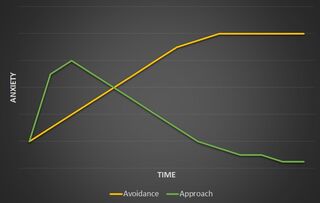Anxiety
Why It's Better to Face Your Problems
It can help you learn your biggest strengths.
Posted October 30, 2022 Reviewed by Tyler Woods
Key points
- Avoidance perpetuates anxiety and, to a certain extent, depression.
- Facing problems can be hard at first, but better long term.
- The overall strategy should be to approach problems in whatever way makes the most sense for the situation.
One of the greatest struggles in therapy is reconciling the motivation to avoid with the need to approach something difficult. It is understandable that when someone is afraid of something, they want to avoid it. When someone feels depressed about something, they may find it easier to not think about why they are depressed than to face the problem and try to solve it. But, long term, such avoidance leads to more depression and more anxiety.
Let’s start with some definitions (sorry). "Avoidance" is when someone does not engage with a problem, situation, or person. Avoidance can be behavioral, where the person physically disengages, or it can be cognitive, which involves attempts to not think about the problem or situation. Avoidance is often contrasted with "approach." Approach means facing the problem or situation, trying to generate and use solutions, and can also be thought of as coping or dealing with the problem. Just because someone is approaching a problem does not guarantee that their strategies are effective, but, in general, approaching a problem versus avoiding it is more helpful.
Avoidance can play a role in perpetuating anxiety and depression. With anxiety, there is a strong tendency to avoid things we fear. However, avoiding these things too often means we don’t learn how to face these problems or situations and don’t learn our own strengths. This means we accrue less evidence that we can face these problems and more anxiety the next time the problem comes up. Something similar happens with depression. A person with depression may avoid social gatherings or other activities but this can lead to more depressed feelings because those same activities could counteract depression. For both depression and anxiety, avoidance is a key factor in preventing symptoms from getting better.

Given the harmful effects of avoidance, it might seem odd that people continue to avoid. One reason we do this is that it often gets worse before it gets better. Approaching problems is tough and can lead to a temporary increase in anxiety or sadness. Over time, as a person copes with a problem and learns they do have the strength and skills, the anxiety and sadness fade. But that temporary increase can be difficult to overcome, even when avoidance leads to more anxiety and sadness long term. (The different trajectories are shown in the graph.)
This relationship between avoidance and approach is similar to the relationship between difficult truths and lies. Facing a difficult truth may hurt more now, but lies hurt forever. Learning how to cope with and get past that initial hurt is key to feeling better.
As with anything psychological, there are caveats. Just because someone is not facing a problem, situation, or person does not necessarily mean they are avoiding it. In abusive relationships, the way to face the problem may be to limit or stop contact with the abusive person. It might look like someone is avoiding a problem when limiting contact with an abusive person, but it is actually approaching the problem and setting boundaries.
Sometimes people do not have the capacity to approach a problem. They might have more bandwidth in the future, but if they are too stressed, tired, or emotionally drained, it would not make sense to approach the problem. Trying to face a problem when one does not have the capacity could set someone up for failure. Temporary avoidance, used judiciously, can actually help a person face their anxiety and depression later and slowly start to feel better.
The overall strategy should be to approach problems in whatever way makes the most sense for the situation.
Facebook image: Hector Pertuz/Shutterstock
LinkedIn image: Yandry_kw/Shutterstock


